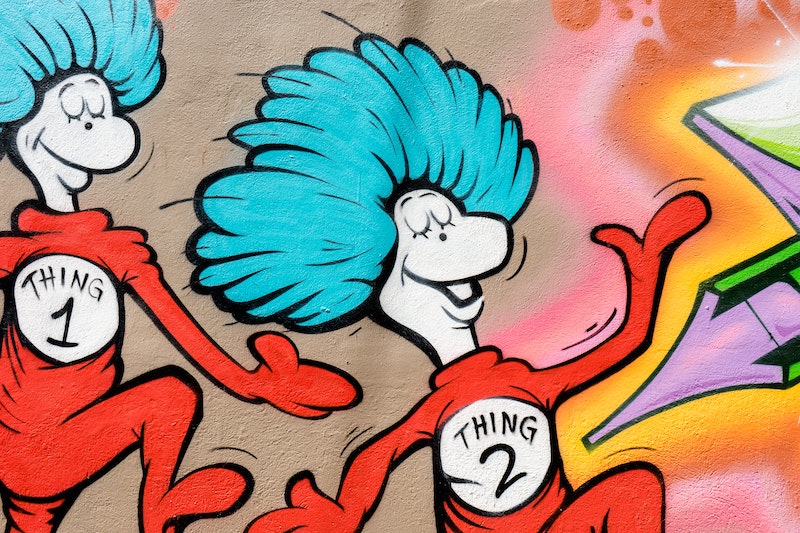Oh, the places you’ll go with these 5 wise and whimsical writing tips.
Known most notably for his fantastical creatures with fanciful names that featured throughout his fabulous rhymes, Dr. Seuss (aka Theodore Geisel) was also a political cartoonist, screenwriter, painter, sculptor and illustrator for several advertising campaigns. He won many awards for his various literary and entertainment projects, including a Pulitzer Prize in 1984. But to my knowledge and research, he never appeared to have written any job advertisements.
While this may not seem all that surprising to you – to me it seems a shame, because he had such a mastery of persuasive language. I’m sure he would have had candidates ‘off to Great Places’ with the same gusto that he’s had children reaching for his books for over 80 years.
“… be your name Buxbaum or Bixby or Bray or Mordecai Ali Van Allen O’Shea,
you’re off to Great Places! Today is your day!”
He persuaded children to try new things, to use their imaginations and to aspire for greatness. And aren’t these the same motivations we should want to inspire in our candidates in our job ad copy to get them to click that all-important ‘Apply Now’ button?
“Simple it’s not, I’m afraid you will find, for a mind-maker-upper to make up his mind.”
So, if you want to write job ads that consistently persuade candidates to make up their minds, here are the 5 Dr. Seuss inspired tips you will need to succeed.
1. Don’t be sloppy – write rhyming copy
“Congratulations!
Today is your day.
You’re off to Great Places!
You’re off and away!”
It’s one of the most engaging and memorable qualities of any Dr. Seuss tale, that comic and lyrical anapestic tetrameter that introduced us to a Cat in a Hat, a Fox in Sock, and Sam and his Green Eggs and Ham.
I’m not saying your whole job ad has to be written in verse, but why not open the copy with an engaging rhyme?
Known as the Rhyme-as-Reason Effect, it’s been shown that when just two words or phrases within a statement rhyme, people are more likely to remember it, and they’ll find it more likeable, trustworthy and persuasive.
2. Repetition, repetition, repetition
“You have brains in your head.
You have feet in your shoes.
You can steer yourself any direction you choose.”
Here Dr. Seuss repeats ‘you’ in a way to add poetic effect to the prose. He also goes on to repeat the themes of ‘brains’ and ‘feet’ across several of the first few pages of the story. Reinforcing the importance of not only your intelligence but of your actions for reaching great achievements.
Repeating keywords or phrases makes key themes and arguments more memorable to your audience.
Studies have found that the more an audience hears a message, the more likely they are to believe it is true. But before you get all copy-paste happy, this repetition is only effective when people are paying less attention. So, a bullet point list of role requirements that repeats the same thing over and over won’t be convincing anyone. Instead, use repetition throughout the copy to reinforce the impact the role will have within the team, organisation, or greater community.
3. Personalise your copy
“You’re on your own. And you know what you know. And YOU are the guy who’ll decide where to go.”
Dr. Seuss commonly wrote his stories as direct conversations with his readers, using the second-person address to great effect to draw his readers into the stories – even making them the leading character like in the above.
Ditch phrases like ‘the successful applicant’ or ‘the incumbent’, this third-person phrasing creates a distance between you and the reader, making the role you are describing feel like it’s for someone else and unattainable.
By using phrases like ‘you will…’ or ‘your role will…’ you can build a more optimistic and intimate relationship between you and your candidates, allowing them to more clearly see themselves in the role. Another tip is to mention ‘you’ (candidate) at least as often (if not more) than you mention we/us (the employer).
4. Write in plain English
“You can get so confused that you’ll start in to race
down long wiggled roads at a break-necking pace…”
Yes, I’m sure you’ve heard this tip before. But as we now know, repetition will make it all the truer.
Dr. Seuss actually wrote The Cat in the Hat as a challenge to create a story using only a list of 225 words that first-graders should be able to recognize. Green Eggs and Ham used less than fifty of these easily recognizable words. The lesson here is how successful plain English can be.
Research shows that even highly literate readers prefer plain English because it allows them to understand information as quickly as possible. And the more specialist their knowledge, the greater the preference for plain English. So, no matter how technical the role you are advertising is, using plain English will give you a greater chance that the most qualified candidates will get through your ad and want to apply.
5. Be a little bizarre
“And will you succeed?
Yes! You will, indeed!
(98 and ¾ per cent guaranteed.)”
Reading about fantastical creatures like the Whos, and bizarre notions like Green Eggs and Ham are all part of the magic of any Dr. Seuss story, but he also used simple surprises like the above to delight his readers – I mean where else would you read about a 98 and ¾ per cent guarantee?
The bizarreness effect refers to our tendency to more easily remember information that is strange, unusual, or “bizarre” over mundane facts and figures.
Using noticeably different words to stand out among the more common phrasing used throughout all job ads will make yours more memorable. You don’t necessarily need to start making up wacky job titles – but try stretching your thesaurus skills to find stronger verbs and more unusual and evocative descriptions of the role.
Dr. Seuss inspired everyone from six-year-olds to NASA spacecraft engineers and left behind a gigantic legacy of genius and imagination. And while job ads might not be at the top of this legacy, (or even anywhere in the middle) some simple elements of his genius can be applied to help you write more persuasive and memorable job ads – 98 and ¾ per cent guaranteed!


